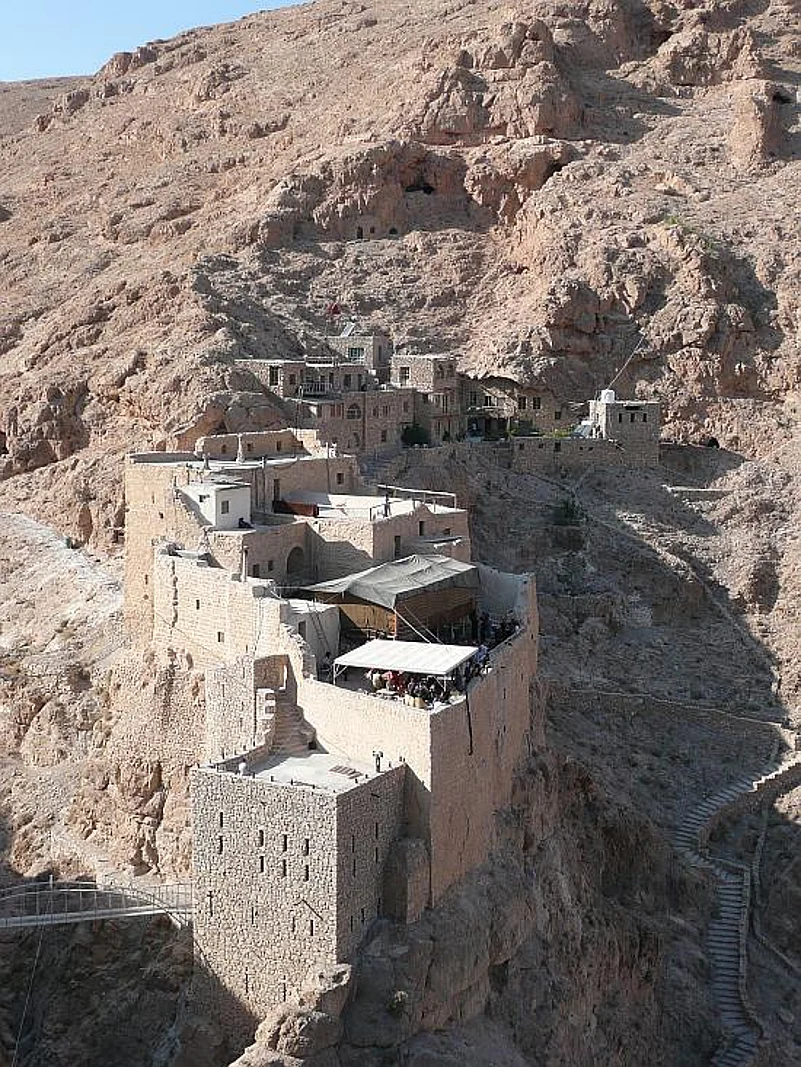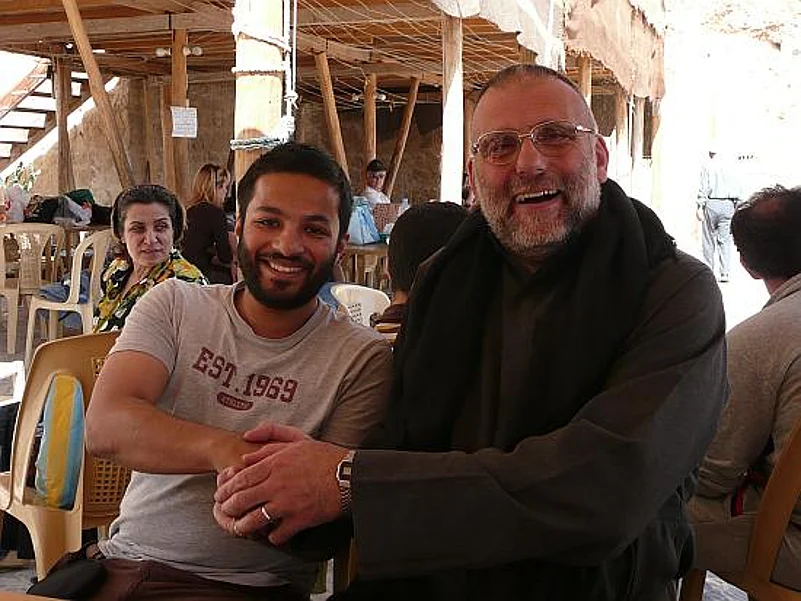Some of the world’s most ancient Christian communities are found in the Arab world. Sadly, however, religious persecution has forced many Christians to flee the West Asia and seek refuge in Europe and America. In recent years, the numbers of people leaving their homeland has increased exponentially particularly in Syria and Iraq. In their host countries as well as more generally, it is often forgotten that the Eastern churches are very different from their European counterparts.
Some years ago when I first arrived in Syria I went to the shrine of Sayyidah Zainab, the Prophet's grand-daughter and the daughter of Imam Hussain, which is in the suburbs of Damascus. At night, on the way back to the old city, I couldn't find the right bus until a tall gaunt man asked if he could help. I asked him to tell me which minibuses went to Souq al-Hamidiyyah, one of the oldest markets in the old city. He told me where to wait and then said he would stay with me until the right bus came. He spoke broken English and I replied in broken Arabic having just begun my classes at the university there. It transpired that he was a Christian refugee from Mosul where he had been a basketball coach. He said that he had come to pray at the shrine of Sayyidah Zainab since she too was forcibly brought to Damascus, albeit as a prisoner and not as a refugee not that there is much difference between the two. He was on his way to London while his wife, whom he had not heard from for two weeks, was also headed to London but via Helsinki.
Today there has been another exodus from Mosul as well as many other Christian communities in other parts of Iraq as well as Syria. Most recently this has been because of a frightening announcement by ISIS that Iraqi Christians need to either pay jizya, protection money to the tune of nearly $400 per month per person or convert. If neither option is taken then offenders will be killed. To identify them, ISIS foot soldiers have gone around painting the letter 'Noon' on the doors of Christian houses. The letter stands for Nasrani, an Arabic word for Christian.
Of course this threat has only exacerbated the urgency with which people are leaving their homes. Some have headed north into Kurdish controlled areas, others have headed for Baghdad and yet others have found refuge in the shrines of Najaf and Karbala where Sayyidah Zainab's father and brothers are buried. A small number, who can, have also tried to head for Europe and America. Not so long ago, driving from Karbala to Najaf, I saw huge number of empty mowakib or rest stops for pilgrims along the side of the road. These normally only come alive in the month of Muharram when pilgrims walk from Baghdad and other cities to Karbala but nowadays they have offered shelter to some of the thousands of Christians feeling with their families. Needless to say, the barbaric and vile statement that led to this exodus is as alien to Islam as the people who made it but there have been very few voices of protest, particularly amongst Muslims.
Of course with the assault on Gaza, the situation in Syria and the efforts by ISIS to recruit in Lebanon, the whole region is in tumult. Although Lebanon has a thriving Christian population sadly sectarian conflict is an ever-present reality. One of the few places where Arab Christians are ‘integrated’ is Jordan, as Prince Hassan bin Talal said in an interview in 2001, although he was worried even then of the exodus of Arab Christians from the Middle East noting that there were more Christians from Jerusalem in Australia than Jerusalem itself. What is often forgotten is that the Christian communities are culturally Arab.
Advertisement

Mar Musa Monastery
Mar Musa, a sixth century monastery in Syria, which was founded by the son of an Ethiopian king who gave up his throne, is a testament to this. The phrase Bismillah ar-Rahman ar-Raheem, 'In the name of God the Merciful and the Compassionate,' written in Arabic calligraphic script adorns the walls of the church, nestled between frescoes that date back to the 11th and 12th centuries. This phrase is also the first verse of the Quran. Daily services are often conducted in Arabic and during the prayers God is referred to as Allah. Apart from the obvious theological differences, most notably references to Jesus as the son of God, a lay person would have trouble telling these prayers apart from Islamic prayers. The service I attended was conducted by Father Jihad, a name which is unfortunately often only associated with militarised extremists.
Advertisement

The author with Father Paolo Dall'Aglio
Outside the church is a tent called 'the tent of Abraham' indicating one of the purposes for which this monastery was restored in the 1980s. Father Paolo Dall'Oglio, an Italian Jesuit priest and an erudite polyglot, and a hulk of a man, envisioned the monastery as a place that would facilitate inter-religious dialogue particularly between Christians and Muslims. Indeed the majority of the visitors to the monastery were Muslim.
Following the Syrian uprisings, Father Paolo was asked to leave Syria by Al-Assad's government and he was kidnapped by ISIS exactly a year ago on the 29th of July 2013 while trying to negotiate for peace between different rebel groups. His family has issued an appeal for his release hoping that he is still alive although confirmed reports suggest he has been executed in Al-Raqqa. If he has become yet another victim of the evil propagated by ISIS and its ilk then the world has lost a man who brought 'light' unto the world. As a friend of mine recently said, “the true strength of a person, religion, or people lies in the ability to criticize the actions of the in-group,” in other words the group or groups to which they belong. Father Paolo was a man who was willing to criticise his own church and his opposition to the Vatican’s support of the Assad government bears testament to this.
Today there are protests in support of the Palestinians in different cities across the world and Muslim communities in particular have mobilised in support of Gaza. I have argued elsewhere that the biggest misperception is that the Israeli-Palestinians conflict is about Islam. It is about a people's right to their homeland. In India various Muslim religious leaders have made statements condemning Israeli aggression and people have taken out rallies, courted arrest and used social media to protest. Sadly however there has barely been any mention of the thousands of Christians who are suffering the same fate as the Palestinians and are being uprooted from communities, some of which are more than 1600 years old. A small number of young people have changed their Facebook profile pictures to the letter 'Noon' in solidarity with the Christians of Iraq, others have tried to raise awareness by posting articles and news items but these gestures, although commendable, are simply not enough.
Why are public platforms not being used to raise awareness of the persecution faced by Christians in Iraq? Why are there no protest marches? Why are there no aid packages being dispatched? In societies where literacy is not that high, it falls on the social, political and religious leaders to speak up. Perhaps the truest measure of a person’s humanity is their ability to transcend ethnic, racial, religious and tribal differences and treat the suffering of others as their own. For surely, one of the best forms of worship is to be of service to those who are less fortunate, regardless of their background.
Ali Khan Mahmudabad is a PhD student in History at the University of Cambridge who writes a fortnightly column for the Urdu Daily Inqilab



















